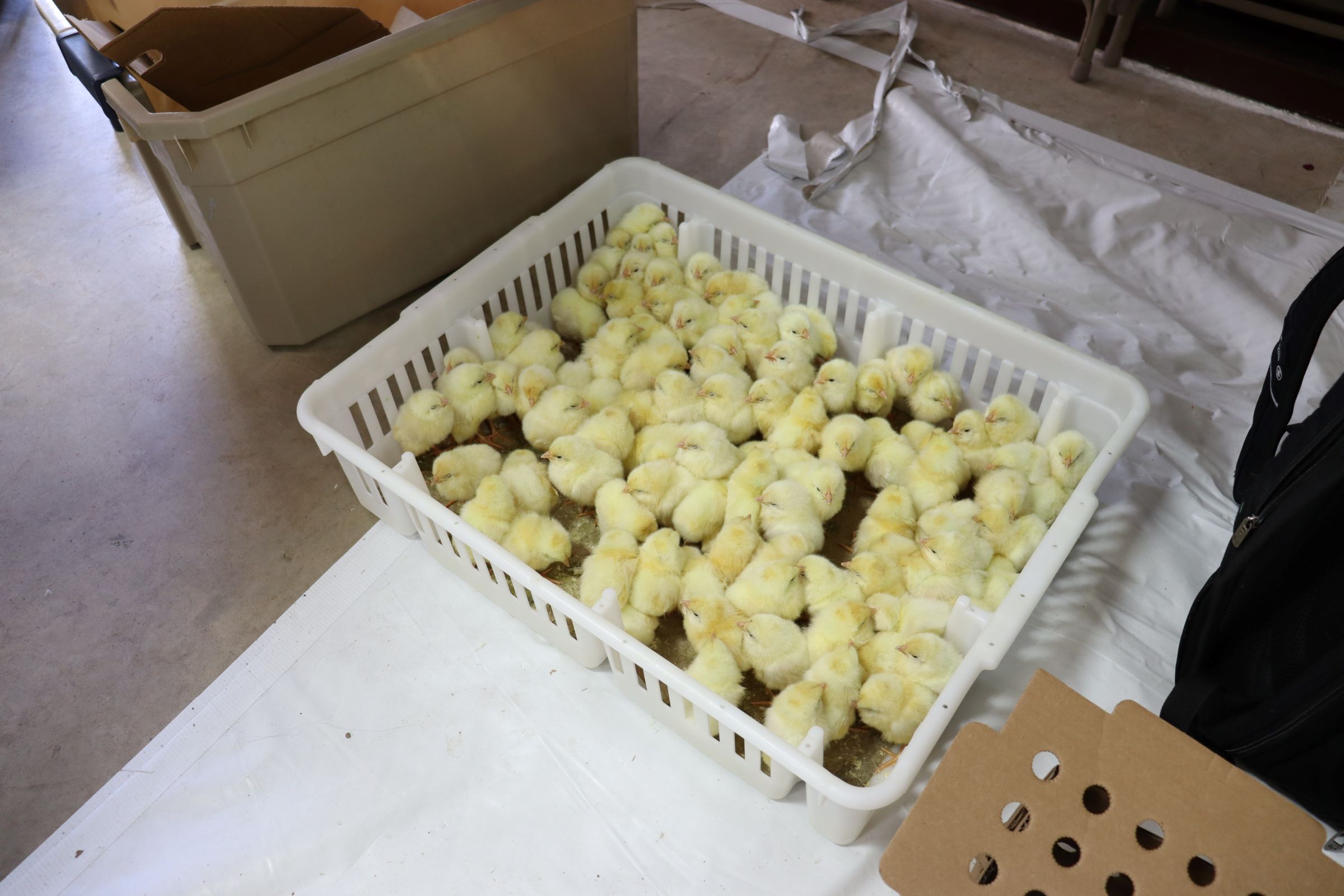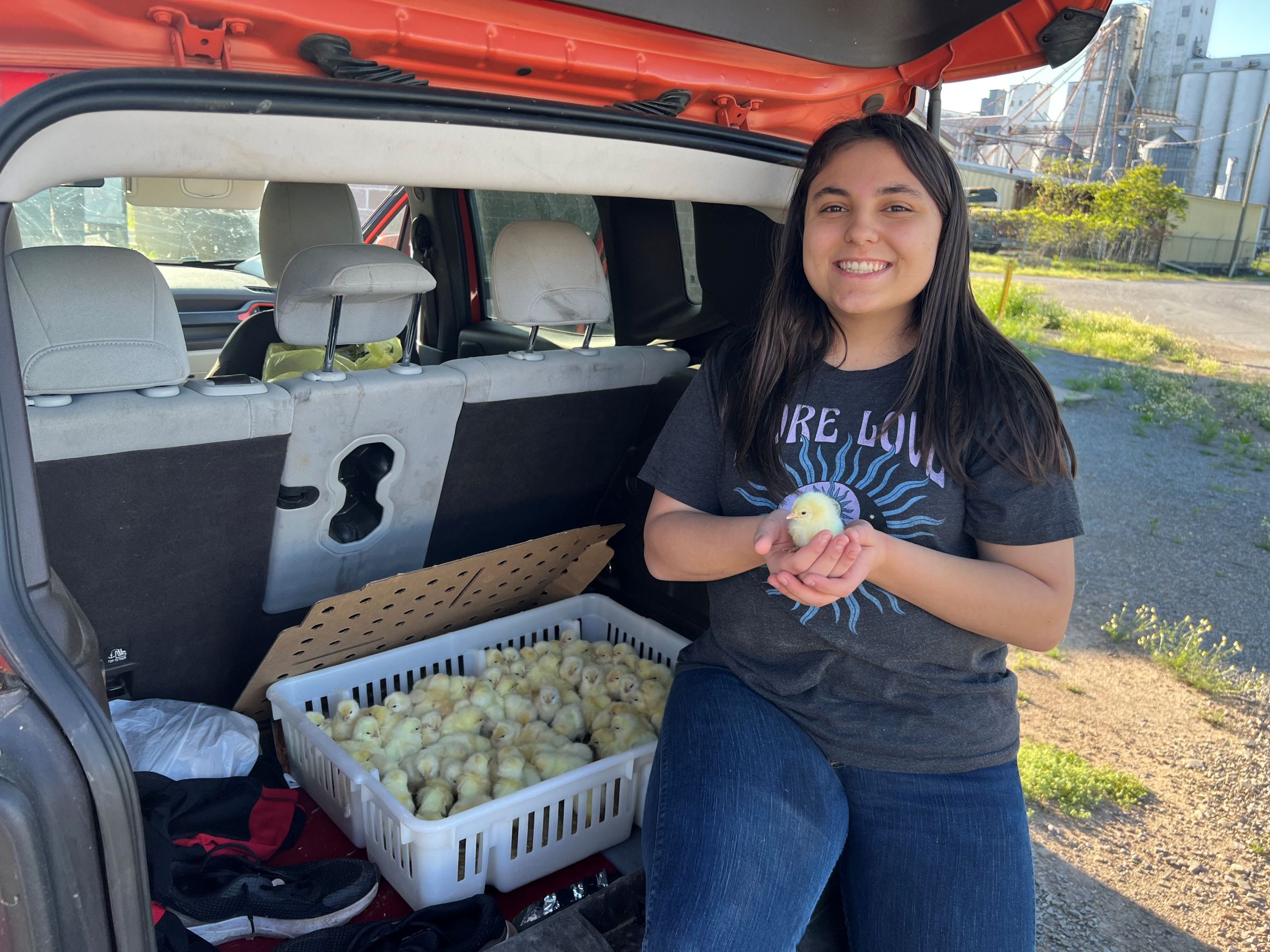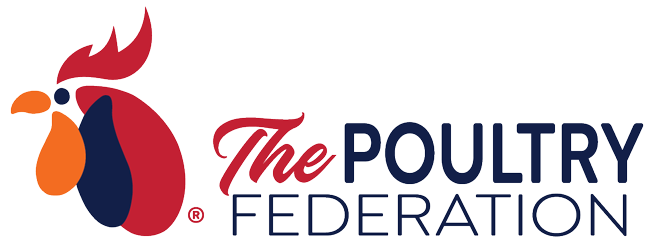A record number of 2,260 youth in 69 counties received more than 38,000 chicks through the Poultry Chain program, designed to help to teach industry youth responsibility, animal husbandry and flock management. This marked 2023 as the largest number of Poultry Chain participants in program history.
The sound of 38,000 peeping chicks filled the air at the Lonoke County Fairgrounds on April 12 as the birds awaited their distribution to more than 2,000 youth across Arkansas.
The event marks the start of preparations for poultry contests at county, district and state fairs in the fall. It’s part of the Poultry Chain program organized by the Cooperative Extension Service, part of the University of Arkansas System Division of Agriculture. The program’s goal is to educate Arkansas 4-H youth about poultry management and animal husbandry.
Arkansas System Division of Agriculture. The program’s goal is to educate Arkansas 4-H youth about poultry management and animal husbandry.
Members of Arkansas 4-H and the National FFA Organization from 69 counties each received flocks of 15-16 two-day-old chicks. Scharidi Barber, extension poultry instructor for youth programs for the Division of Agriculture, said 2,260 youth will receive chicks this year— the largest number of participants in the program’s more than 40-year history.
“It has really taken off, and I think a lot of that has to do with egg prices, and everyone is wanting to raise their own,” Barber said. “I just hope they took into consideration the feed prices and that you don’t get eggs for five or six months. But when they do, they’ll have an awesome project in their backyard that they can expand on later in their program.”
Barber said participants learn and practice many skills through the project, but “the biggest thing is responsibility.”
“You now have a life you’re taking care of. It’s not like a plant that you water every now and then, it has a heartbeat,” Barber said. “It takes daily feed and water, and you have to provide the right environment, which we call husbandry. The husbandry that you provide will really show in the end. You’ll see the kids who win these competitions are the ones that had the best environment for their birds.”
Participants will raise Lohmann White chickens, a year-round egg layer that can begin laying eggs around 18 weeks. Barber said this breed is “more feed-efficient,” making them a cost-effective option for the program amid high feed prices.
“You can feed your birds less, and you’ll get higher egg production,” she said.
Level Playing Field
An additional benefit of all participants raising the same breed of bird is that this creates a level playing field for poultry competitions, Barber said.
“The cool thing about this project is that it’s probably the fairest project, as far as livestock and poultry goes,” she said. “It’s not like Mom or Dad could afford a better steer than somebody else. For this project, they are all the same genetics and all from the same hatch. At the end of the day, we find out who can raise the best bird using husbandry, environment and your feed program.”
Kaitlyn Caswell-Mogish, 15, a 4-H member in Lonoke County, began participating in the Poultry Chain at age 7 and said she looks forward to it every year.
“My favorite part is getting to exhibit the hard work I’ve put in by showing my Poultry Chain,” Caswell-Mogish said. “That blue ribbon, when you get it, is an amazing thing because it shows that you put in the time and effort to raise quality animals. It teaches you responsibility and the basics of managing a bigger flock.”
On her family’s farm, Caswell-Mogish also raises rabbits. When she’s finished exhibiting her Poultry Chain birds, she puts them with the rest of her family’s flock, and members of her community purchase eggs from them. She said participating in 4-H has inspired her future career plans.
“Through 4-H, it sparked a love for agriculture, and I’m planning to become an ag teacher in the future,” she said.
Learning Economics
Like Caswell-Mogish, Barber said many Poultry Chain participants begin selling their birds’ eggs, creating a sustainable project with educational and monetary benefits.
“When these birds reach sexual maturity and start laying, kids can turn it into an economics project,” Barber said. “They ask, ‘How can I make money off of this?’ They look up the proper ways to do this, including the Arkansas laws for it, so they can sell their eggs properly and turn it into a business. Then we have little entrepreneurs everywhere. It’s a really great project that doesn’t take a whole lot of space, and they can breed their birds and continue the cycle.”
For more information about Arkansas 4-H poultry science programs, visit the Cooperative Extension Service’s 4-H Plant and Animal Science website.
Pictured (Top to Bottom)
- Chick Distribution (Division of Agriculture photo)
- Kaitlrn Caswell-Mogish (Division of Agriculture photo)
About Arkansas 4-H
Arkansas 4-H is a youth development program operated by the Cooperative Extension Service, part of the Division of Agriculture. The program teaches participants life skills through the “learn by doing” model. Program participants gain knowledge through non-formal, science-based, experiential education activities.
For more information about 4-H, contact your local county extension agent or visit 4h.uada.edu.
To learn about extension programs in Arkansas, contact your local Cooperative Extension Service agent or visit www.uaex.uada.edu. Follow us on Twitter and Instagram at @AR_Extension. To learn more about Division of Agriculture research, visit the Arkansas Agricultural Experiment Station website: https://aaes.uada.edu. Follow on Twitter at @ArkAgResearch. To learn more about the Division of Agriculture, visit https://uada.edu/. Follow us on Twitter at @AgInArk.
About the Division of Agriculture
The University of Arkansas System Division of Agriculture’s mission is to strengthen agriculture, communities, and families by connecting trusted research to the adoption of best practices. Through the Agricultural Experiment Station and the Cooperative Extension Service, the Division of Agriculture conducts research and extension work within the nation’s historic land grant education system.
The Division of Agriculture is one of 20 entities within the University of Arkansas System. It has offices in all 75 counties in Arkansas and faculty on five system campuses.
The University of Arkansas System Division of Agriculture offers all its Extension and Research programs to all eligible persons without regard to race, color, sex, gender identity, sexual orientation, national origin, religion, age, disability, marital or veteran status, genetic information, or any other legally protected status, and is an Affirmative Action/Equal Opportunity Employer.
Media Contact
Rebekah Hall,



































